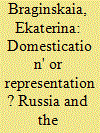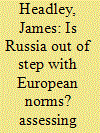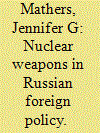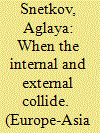|
|
|
Sort Order |
|
|
|
Items / Page
|
|
|
|
|
|
|
| Srl | Item |
| 1 |
ID:
112159


|
|
|
|
|
| Publication |
2012.
|
| Summary/Abstract |
Muslim integration in Russia is traditionally treated as a distinct field of research due to the diverse nature of Muslim communities and particular state approaches to ethnic and religious tolerance. The essay discusses Russia's historic engagement with Islam and suggests that some of its contemporary developments should be examined through a comparison of similar and different attempts to institutionalise Islam in Britain and France. The value of such a comparison lies in better understanding similar challenges to promoting moderate forms of Islam and engaging with Muslim representative institutions within different national contexts. Although the three countries developed different policies for integrating Muslim citizens, there is a degree of convergence in state determination to impose tighter security measures while using more integrationist rhetoric. Russia's engagement with Muslim communities provides an interesting hybrid which is partly reminiscent of Britain's multicultural aspirations and partly of France's drive for regulatory efficiency.
|
|
|
|
|
|
|
|
|
|
|
|
|
|
|
|
| 2 |
ID:
112152


|
|
|
|
|
| Publication |
2012.
|
| Summary/Abstract |
This article examines the question of European identity in Russian foreign policy through the notion of European norms. By considering attitudes towards the death penalty, it identifies different strands of thought in the Russian elite, and argues that an assertive Europeanism is now dominant as Russia seeks to be an equal participant in the development of common norms. However, there is a tendency for Russia's 'Europeanness' to be questioned because of behaviour that is considered out of step with European Union standards. I argue that even in an area of significant controversy between Russia and other European states, self-determination for national minorities, there is potential for the delineation of common principles, but only as an inclusive process on the basis of consensus.
|
|
|
|
|
|
|
|
|
|
|
|
|
|
|
|
| 3 |
ID:
112151


|
|
|
|
|
| Publication |
2012.
|
| Summary/Abstract |
Focusing on diverse state approaches to nationalism provides a more nuanced view than that of Russian domestic and foreign policies driven directly by revanchist nationalism. The Russian authorities' 'official nationality' is moderate in aspiration. However, the effect is less benign because the Kremlin both mobilises extreme nationalism for regime goals and suppresses it when it becomes destabilising. This approach prevents nationalism either of extreme or moderate orientation becoming an influential, independent force in Russian politics. Such conflicting imperatives make Russia a more unpredictable international partner than if its policies were founded on a consistent ideological nationalism.
|
|
|
|
|
|
|
|
|
|
|
|
|
|
|
|
| 4 |
ID:
112155


|
|
|
|
|
| Publication |
2012.
|
| Summary/Abstract |
This essay is based on a close reading of speeches and other public statements made by Vladimir Putin and Dmitri Medvedev during their presidencies, covering the period 2000-2010. It argues that the pattern of presidential discourse reveals that both presidents have regarded Russia's nuclear weapons as primarily political rather than military instruments. Both Putin and Medvedev demonstrated a sustained desire to pursue strategic nuclear arms reductions through negotiations, particularly on a bilateral basis with the United States, and an interest in minimum nuclear deterrence. The shifts in position taken by both presidents on US plans for missile defence in particular reveal that they each attached as much, if not more, importance to Russia being regarded as an equal partner by the United States than to any strategic gains that might be achieved through preventing the deployment of an effective missile defence system.
|
|
|
|
|
|
|
|
|
|
|
|
|
|
|
|
| 5 |
ID:
112158


|
|
|
|
|
| Publication |
2012.
|
| Summary/Abstract |
This essay shows how the various Islamic communities or jamaats that emerged in the Muslim republics of the Russian North Caucasus during the early 1990s have evolved since then. Originally conceived as peaceful religious organisations embracing strict Islamic Salafi principles, many of these communities have transformed themselves into fighting units sharing many of the traits of jihadist Islamic movements worldwide. By analysing the radical Islamic discourse and the strategies of leading jihadist fighters in the Russian North Caucasus, this essay also illustrates how their views, ideas and tactics have become similar, if not identical, to the beliefs that are being held and thepractices that are being conducted by fighters of global and regional jihadist movements worldwide.
|
|
|
|
|
|
|
|
|
|
|
|
|
|
|
|
| 6 |
ID:
112157


|
|
|
|
|
| Publication |
2012.
|
| Summary/Abstract |
This essay argues that, although it is tempting to view Russian policies through a revived Cold War paradigm, this is a problematic and ultimately misguided approach. Such an approach ignores the significant sources of discontinuity and rupture between the Soviet Union and post-Soviet Russia. The essay presents an alternative framework for understanding and conceptualising Russia's engagement with the Middle East. This has three dimensions and takes an 'inside-out' approach. First, there are the domestic drivers for Russian engagement which is linked to the perceived need to counter the threat of secessionism in the North Caucasus and the potential broader radicalisation of Russia's Muslim population. Second, there are the more strictly economic interests in the Middle East, which include increasingly important trading relations with moderate pro-Western states in the region. And, third, there are the geopolitical considerations which certainly include potential competition with the West but also incorporate Russian ambitions to promote its credentials as a responsible great power supporting international norms, such as the principle of non-proliferation and a settlement of the Arab-Israeli conflict. The tension and conflict between these two strands of Russian policy making have been notably present in Moscow's responses to the Arab Spring.
|
|
|
|
|
|
|
|
|
|
|
|
|
|
|
|
| 7 |
ID:
112154


|
|
|
|
|
| Publication |
2012.
|
| Summary/Abstract |
The Russian Far East has, since Gorbachev, been used in foreign-policy discourse as a tool to access the integrative processes of the Asia-Pacific. However, vulnerability, symbolised by the border with China and the asymmetry of the Sino-Russian economic relationship, highlights the geopolitical andgeoeconomic implications of engagement with the Asia-Pacific. The 'modernisation' agenda, which became a leitmotiv of the Medvedev administration, focused attention on the challenges ofdevelopment in this region, but development within this agenda tends to be based on the most optimistic scenarios, and development plans for the border areas are heavily geared towards China. Integration with the Asia-Pacific is often advocated as a means of escaping economic dependence on China, but approaches and strategies remain overly politicised.
|
|
|
|
|
|
|
|
|
|
|
|
|
|
|
|
| 8 |
ID:
112153


|
|
|
|
|
| Publication |
2012.
|
| Summary/Abstract |
In recent years, the Russian authorities have invested significant effort into promoting a positive image of Russia as an energy supplier. Yet, Russia's behaviour sometimes seems to contradict the declared aim of improving this image. A particularly interesting case is the way the Russian authorities and Gazprom handled the dispute with Ukraine over gas prices in December 2008-January 2009, when the transit of Russian gas to a number of EU member states via Ukraine was seriously affected. This essay argues that in order to understand Russia's position during the crisis, one should take into account the impact of international images on Russian politics, in particular self-images and constructed images that the Russian authorities have been projecting in the West and in Russia itself.
|
|
|
|
|
|
|
|
|
|
|
|
|
|
|
|
| 9 |
ID:
112156


|
|
|
|
|
| Publication |
2012.
|
| Summary/Abstract |
This study provides a social constructivist reading of Russia's security policy under President Vladimir Putin, by investigating the relationship between the internal and the external security spheres and state identity through the prism of Russia's narrative on the fight against terrorism. Drawing on social constructivist theories of identity, security and narratives, it argues that a change occurred in the Putin regime's conceptualisation of Russian state identity: from an initially weak state which prioritised internal security threats and the fight against terrorism, to a strong state, whose main security 'Other' was the West, by the end of Putin's presidency. This resulted in less priority being given to the terrorism issue in the official discourse and the widening of the notion of 'threat' and 'terrorism', in line with a developing security narrative in both internal and external spheres.
|
|
|
|
|
|
|
|
|
|
|
|
|
|
|
|
|
|
|
|
|